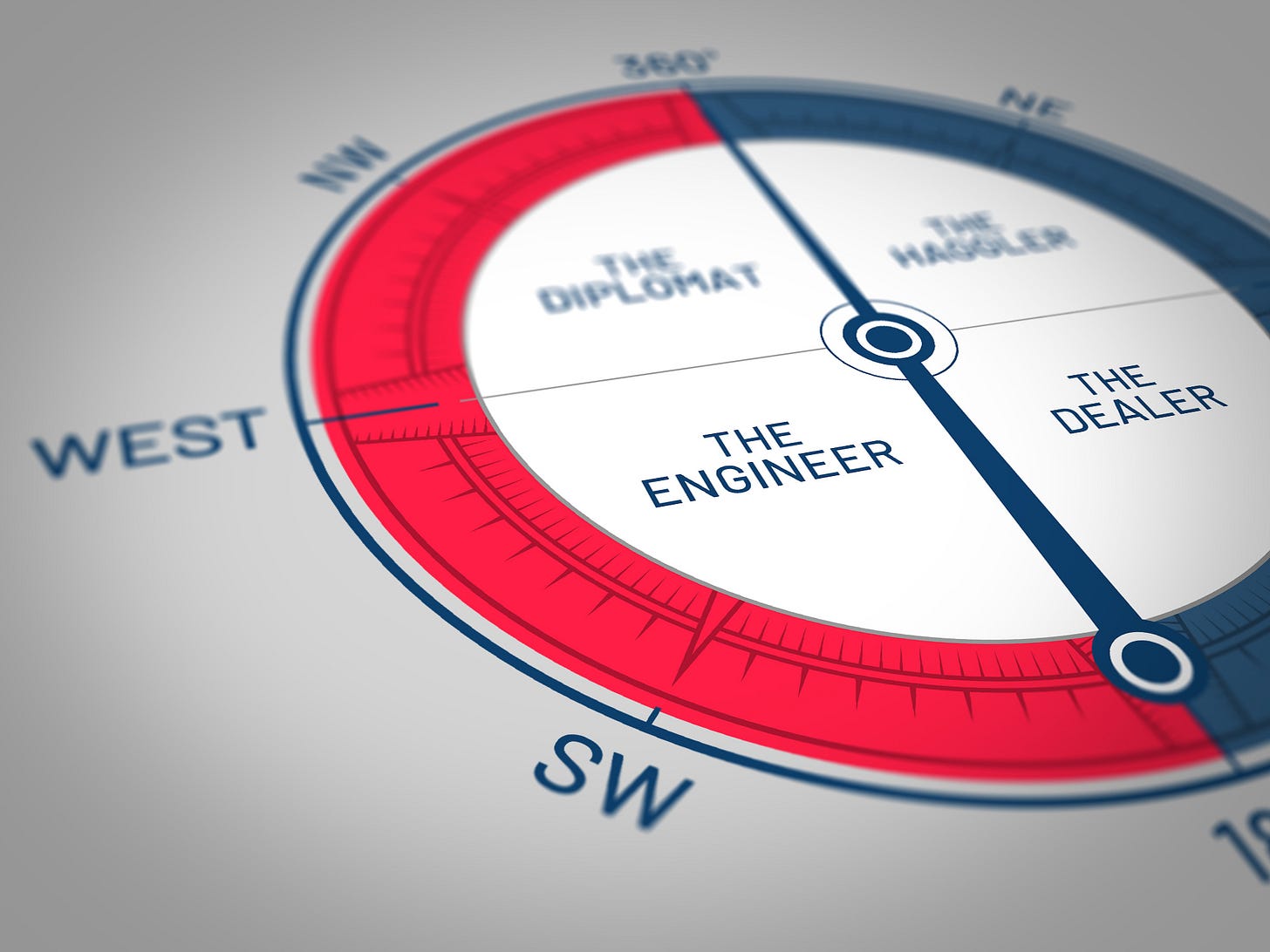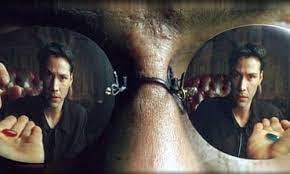Negotiation: Managing Tough Stakeholders
Challenge yourself. Why are they being tough towards you? Are you the problem? There is no such thing as Win/Win. It just doesn't exist. But you can use negotiation skills to manage tough stakeholders
The Weekly Walkaway highlights negotiation in its ‘good’, ‘bad’ and sometimes ‘downright ugly’ forms. Issue No. 68 (8th March 2024).
The Weekly Walkaway is free for all subscribers. After consultation with our most active members we created the following benefits for paying members;
If you pay £1 per week to support the community then we will give you;
1 hour of complimentary negotiation coaching, per year;
You'll also get access to our archive as a learning resource and;
if you pay annually you’ll also get 20% discount on public negotiation workshops.
To be a founding member you’ll get a lot more. Click the link above to explore the benefits.
Summary of The Thought of The Week
We delve into strategies for effectively dealing with challenging stakeholders using a live case where a client of mine had been finding an external stakeholder difficult to deal with..
Read on for more….
Thought of The Week
Negotiation: Managing Tough Stakeholders
Challenge yourself. Why are they being tough towards you? Are you the problem? Is it what you are doing that is creating their response? Is it what you did or didn't do last time? Remember behaviour breeds behaviour.
I have been dealing with an individual this week, a client, who has been struggling with a particular stakeholder; an internal recruitment manager. This guy has shown particularly arrogant, cold and overly tough behaviours towards my client.
This we decided was not a tactic of the stakeholder. They were not using the Angry Gorilla. We concluded this was a behavioural issue.
In our coaching calls we discussed a few fixes he could put in place to manage this stakeholder, and even manage himself to help address the situation.
So this week we're talking about how you can wrangle those tough external stakeholders
Managing difficult external stakeholders is challenging, but employing effective negotiation can help navigate such situations.
In the context of recruitment, dealing with tough stakeholders such as clients, hiring managers, and even candidates requires finesse, patience, and effective communication.
As we learnt; it can be as fun as a barrel of monkeys!
My first question was; had he built enough Rapport and Trust?
I gave one of my on the spot analogies which when I look back was epic;
I look at building trust with stakeholders like gardening.
I know I know, give it a chance..
Gardening takes time, it takes patience and it takes a green thumb.
Trust building is like planting seeds in your garden, you've got to nurture them for things to grow. You’ve got to water those relationships with genuine interest, sprinkle in some fertiliser, trim and give plenty of sun..
Fact is if you have been known to withhold water or fertiliser in the past the garden aint gonna grow!
Did you dissatisfy them last time?
Were you not transparent? Did you break trust?
Did you say you were going to do something and then…. Didn't do it? So have you become unreliable?
Or even, have you rushed things and assumed a relationship where there was none?
What I’m trying to say Walkawayers is that trust takes time.
You’ve got to be reliable and you’ve got to appreciate The Law of Reciprocity; behaviour breeds behaviour.
BUT: Let's be frank; you don't need trust to negotiate!
I explained he could still negotiate good deals with no trust at all… but that he’d forever be on the Eastern Side of The Kahvay Negotiation Compass; where his stakeholders would remain cold, hard, tough and even arrogant towards him.
We agreed that to be on The Western side of the negotiation Compass would be better and that he needed trust and where his stakeholders would be warmer, more open and cooperative.
We continued to discuss and agreed that the old fashioned way of 7 touches is the best way to ‘GARDEN’ trust.
You need 7 touches to be able to claim a relationship. 7 real touches, not digital. I’m talking face to face, guys;
Walking and talking;
Breaking bread;
Solving problems together.
Yup, having those 7 touches is the best way to manage tough stakeholders. I used to meet mine at the train station with a coffee and then walk to their offices together, where I would leave them to their day… no business having been spoken.
And yes. This takes time. So don't rush it. Show genuine interest in your stakeholder's perspective, acknowledge their concerns, and communicate transparently.
Building this positive relationship fosters cooperation, collaboration and warmer, more open behaviours.
Secondly we touched on identifying the stakeholders Interests and Concerns:
Together we climbed to the top of his metaphorical lighthouse and looked down on the situation from a different perspective. We tried to get into his stakeholders head to find out what makes him tick.
And I mean tick.. Either that nervous eye tick when the stress is on or the energy and motivation behind his actions:
Is he all about deadlines? Who’s deadlines? Is he in charge of those deadlines? Is there someone else controlling that clock?
Quality? His own quality and how his delivery or lack of delivery could be causing issues internally? My clients quality, past or present and had that created frustration?
Circumstances? What are his competitors doing? What are the market conditions and how is scarcity affecting them? Who has the power? Who has the perception of power?
We agreed that my client needed to put more effort into understanding the interests and concerns of this recruitment manager. Not just what they wanted to hire.
He agreed to take the time, in the next meeting, to ask questions and actively listen to the stakeholders' needs, preferences, and constraints and try to get into their head by fully appreciating their frustrations and motivations… without feeling the need to justify, explain or defend themselves.
Just to question, shut up and listen.
Alongside understanding his stakeholders interests and concerns we also discussed the need to deliver negotiation satisfaction
Negotiations don't have to be like a showdown at high noon and they also don't need to end with everyone singing "Hakuna Matata"!
But we need to always focus on satisfying our counterparts.
Whether we are on the East or West of The Negotiation Compass they need to feel satisfied, the feeling that they’ve got a good deal, whether they did or not, this feeling is the key.
Nothing else matters.
Because, if they don't feel satisfied at the end of your negotiations… and you are in perpetual negotiations, they will negotiate harder, tougher, colder and more arrogantly with you the next time… fact!
Had this been the problem all along?
REMEMBER: There is no such thing as WIN/WIN!
It just doesn't exist. Win/Win is fanciful and misunderstood. Most just think it is like a crap Disney movie where everyone gets a fair split and sings "Hakuna Matata" at the end.
IT JUST DOESN'T HAPPEN folks…
You will win but because they are better trained or have more power they will win much more… or if you have more power and are better trained then maybe then you will be the one who wins more…
The key still remains, have you satisfied them?
Have you made them feel like they have won, that they were the ones who won more…?
My client reflected and admitted that in previous discussions he had reciprocated his stakeholders behaviour and competed;
Ego vs Ego;
Parent to Parent;
And might also have flexed with his short term wins.
He agreed to address this and manage his competitive behaviour the next time and look to give his stakeholder the win, to stroke his ego and keep the relationship positive for future interactions.
This of course triggered a chat about Managing Emotions
Their negotiations had got pretty heated.
Negotiations can get heated. They are meant to be uncomfortable, tense.
You are not meant to feel relaxed. If you do, you're either;
Not pushing for ‘more’ and are probably giving away more and more value as you keep comfortably chatting away as if you're at a picnic or tea party!
Or ‘they’ are doing something to you.. Stroking your ego.. Making you feel like you're winning!
We discussed;
managing his Lucy, his Chimp in his head, and keeping as cool a polar bear in a snowstorm;
Controlling his own emotions will go a long way to controlling his stakeholders.
The reality is that if he remained cool under the pressure and remained professional he would create the perception of power and the law of reciprocity would work in his favour as he controlled his stakeholders behaviours by controlling his own.
To stay calm, composed and empathetic. Addressing any conflicts or tensions calmly and constructively.
This is how I stay cool and calm. I take my dogs for a walk…
At the end of the day and as a last resort my client needed to develop his BATNA’s
Best alternative to a negotiated agreement. It's your Plan B.
Think of it as your escape route in case negotiations go south. Kind of like having a parachute to avoid a bad deal.
Their safety net just in case the stakeholders' behaviours turned from tough, cold arrogance to aggression or failure to agree, deadlock.
So another action my client took away was to understand his BATNA. What are his alternatives if future interactions and negotiations don't go well? If he was unable to change the behaviours of his stakeholder.
This knowledge will give him leverage and confidence and if all else fails he will know that he can just Walkaway. He deserves better!
Summary
We have delved into strategies for effectively dealing with challenging external stakeholders using a live case where a client of mine had been finding an external stakeholder difficult to deal with..
In our discussions we were able to emphasise the importance of understanding the root causes of the tough behaviour, such as lack of trust or unmet expectations.
We were able to create positive actions, through building trust, identifying stakeholder interests, delivering negotiation satisfaction, and managing emotions, to help my client navigate this difficult situation successfully.
Additionally, we touched on the need for my client to develop his BATNA’s (Best Alternative to a Negotiated Agreement) as a valuable tool for maintaining his leverage and confidence in any future negotiations.
The Weekly Walkaway is a reader-supported publication. To receive new posts and support our work, consider becoming a free or paid subscriber.








